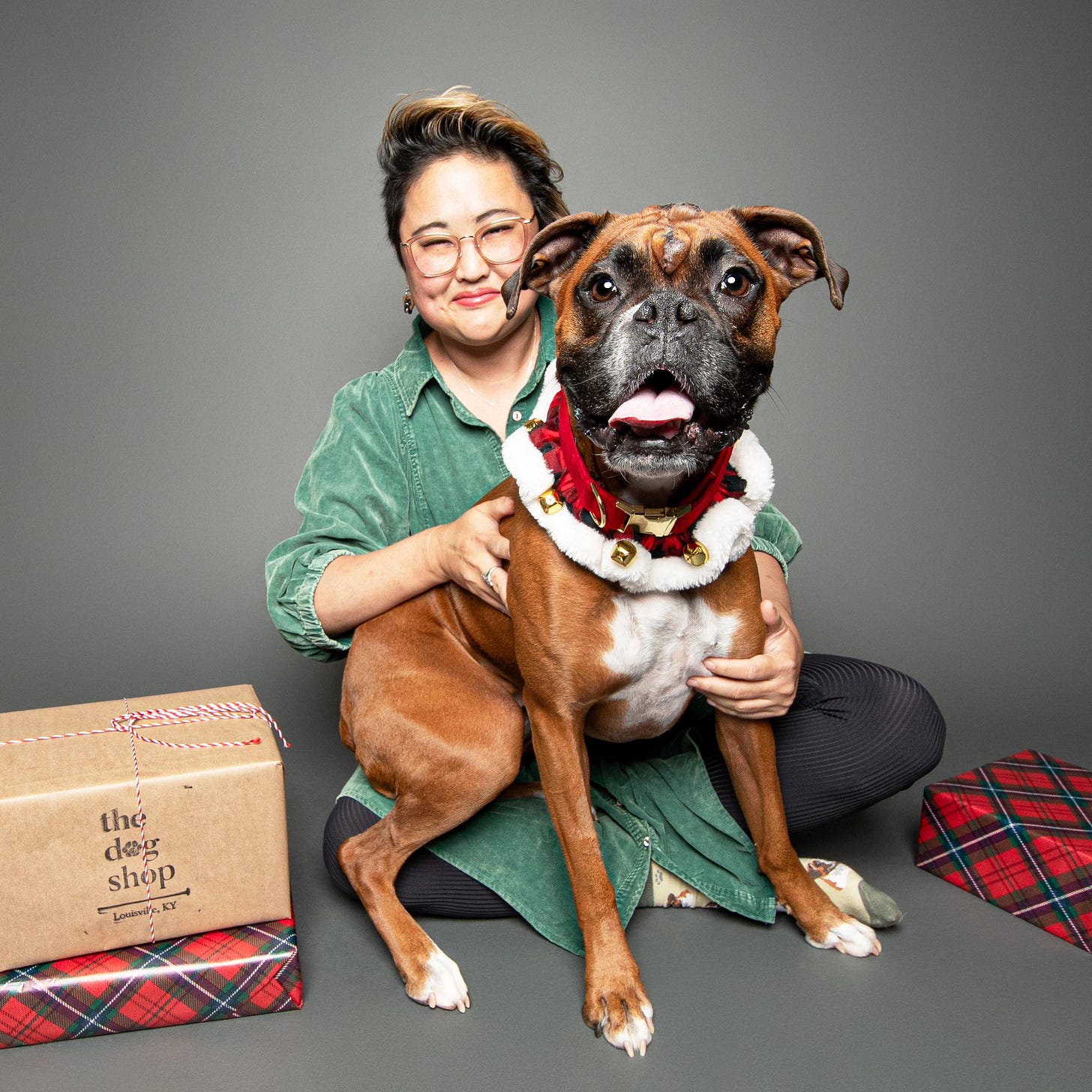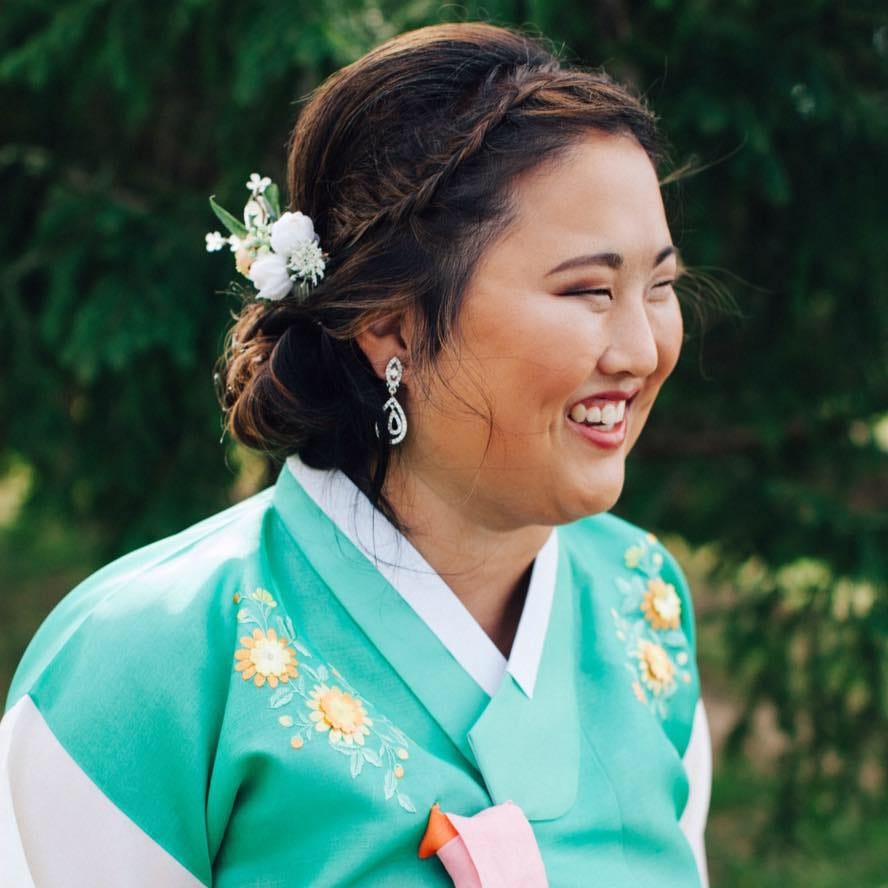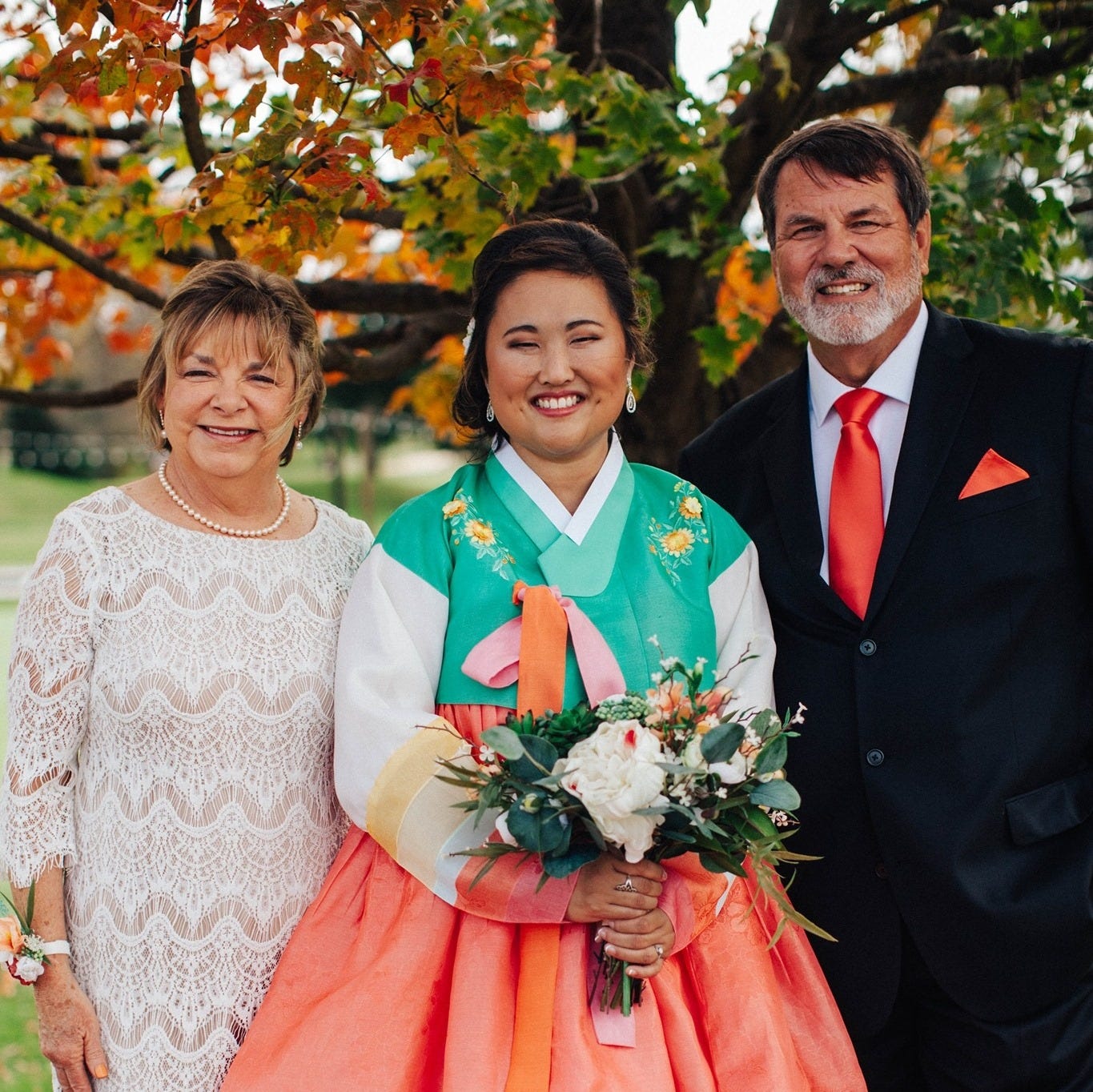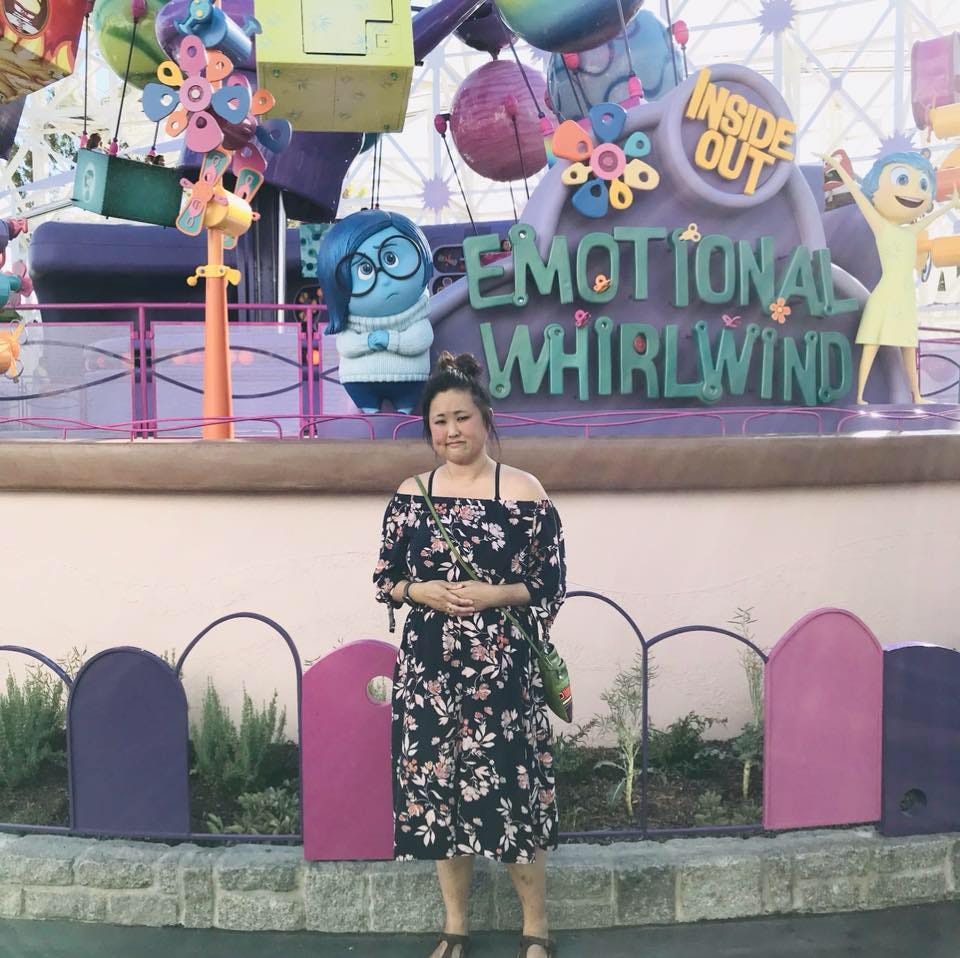Exploring with Katie Gagel
A Q&A with Korean Adoptee, Mama to Luna the Boxer, Podcast Host, Community Advocate, and Friend
I’ll let you in on an inside joke that Katie and I have shared from almost the first moment we interacted. After 5+ years of a friendship, we will finally meet in person. And on that day, in that moment, we will run toward one another, holding our arms wide, moving in slow motion just like they do in the movies: through a field of wildflowers, blue sky, puffy clouds, butterflies moving out of our way as we glide across the horizon to reach each other and embrace.
More likely, we will look up at a convention center somewhere and realize who’s standing directly next to us. We’ll crack up and still go in for that hug, because sometimes, connections can be made across internet and phone lines long before you meet in real life.
It’s one of my favorite things about this community: the moment you eventually cross paths with someone in person after communicating and admiring from afar. We have several mutual friends and have had many close calls, but it hasn’t happened yet. It’s okay.
In the meantime, we’ve interviewed one another via “official” capacities in our role as advocates and allies, and reached out to the other during low times seeking support, panning for gold in the wisdom and insights in each other’s experiences.
To me, Katie The KAD is iconic in this community. I came across her on Instagram early on in uncovering my own story about how race and adoption impacted my life. She shares with a humble grace and earnestness, void of ego or pretentiousness. It’s why people are drawn to her. It’s refreshing to listen to someone’s honesty, someone who has done real work to exist in this world in a healthier framework for herself, even if it goes against what we hear everyday in the media and our social spheres.
You can tell when someone doesn’t realize how much of a difference she’s made in the lives of others. So, in the spirit of saying obvious things - one of my personal mantras while being in Korea -
Katie: You make a difference to me.
Early on, before you knew I existed, you made me feel less alone. You made me feel seen. You were (and are) a trusted voice and perspective in our community. I know there are thousands who agree.
When we do meet in person, it’ll be nothing short of epic.
Follow Katie on Instagram. Check out her insights on The Adopting Wellness Podcast, with Laura Summers on Spotify or Apple Podcasts.
And Katie, thanks.
What should we know about you?
I’m Katie! I live in Louisville, KY and I’m a dog mom to a Boxer named Luna. I’m an Enneagram 1. That explains a lot. <chuckles> I have a lot of passions and I also don’t care about the majority of things in the world.
Is that bad?
It’s probably bad. Let me explain.
I think that is driven by this deep place of apathy that I’ve had my whole life. And it’s not out of disrespect, but it’s that - zooming out and seeing the globe of Earth - most things are not that important in the grand scheme of things. And that’s kind of how I live my life. But I’m probably leaning a little too hard on the “I don’t care.” <laughs> I live my life like an Eeyore and Sadness from Inside Out (the movie). Morph ‘em together and that's me! I speak a lot about mental health, adoption, being an adoptee, chronic illness, and I think that I feel deep empathy for people when people share their story with me.
I feel a deep honor that people share their stories with me. And care for their stories.
Was there a catalyst that caused you to begin the journey of exploring how adoption has impacted your life? Was there a moment of prioritizing thinking about it?
It’s something I’ve always thought about. I remember in high school, maybe in grade school, I always wanted to search for my bio family. But in 2009, that’s when I actually started my birth search. I went through G.O.A.L. I went on the “First Trip Home” trip (when it was free). It was wild. 40+ adoptees coming from all over the world meeting at one hotel in Seoul and doing a week and a half trip. I knew they were going to do a birth search. But I don’t know if anyone is really ready for the sh*t show that comes from the actual search.
The first week of the trip was just tourist stuff. The second week they worked with your adoption agency and did a customized schedule based on the information they had about your adoption papers. That included going to our adoption agency to review our files with a social worker and then if you had the name and address of the clinic or the hospital or the place you were left or whatever was indicated in your file, they would send you with a volunteer and go there. They reached out to any biological family that was listed in your files. The Caveat - and Lord knows how they indicate this - some of the bio families were contacted and reached. Other [adoptees] would go in front of the social worker and they’d say, We have your family members’ names and we’re not allowed to give them to you.
We’re talking thousands of miles, showing up and being told: we have this information and we’re not allowed to give it to you. Meanwhile, other people were able to meet their families. Again, I don’t know how they determine that.
It’s f*cking insane.
That trip was the catalyst, but the hardest part about that experience was coming back home. At the time, I was in Kentucky and working at a university. I had no adoptee community there. I faced a very stereotypical: “ How was your trip?” “Did you find your parents!?” <Laughs> Oh my God! It was so hard. I remember telling this one trusted friend, “It was really hard.” He looked at me, never acknowledged me, made an excuse, and he left. I internalized it as, I’m never going to talk about this ever again… which of course, I did. <chuckles> That was a really hard experience. That whole trip was devastating.
What an important point. No matter what someone is bringing to you… I mean, try not to be dismissive, right? It can have such a lasting impact.
BASIC validation can make the difference between someone feeling validated, heard, and free to feeling like they’re alone and no one understands. What’s worse: thinking no one cares.
Where do you think you’re at in your identity journey (when you look back to today when you’re 95)?
Firstly, I hope I never make it to 95! I’m not sure anything good happens after 60! <laughs> My body is failing me at 40. I always feel a tension of being at peace that I’ve done everything I can. I mean, I really have. I’ve done so much in my birth search. But the goal is not to necessarily reunite. Someone once asked me, Why do you keep searching when you know how difficult and challenging it is?
Because I have a right to know. And I have a right to search. And I deserve to know the truth. I don't know exactly what that is or looks like. But I know I have the right to and deserve to try. So, what I hope is that I will be at some kind of peace knowing that I did everything I could.
And I still think I will struggle. It’s just freaking hard. That never goes away. It hasn’t ever gone away for me. The pain I felt when I was a kid, a teenager, 20s, 30s, now 40. It’s still there and it doesn’t go away. And so I just have to acknowledge it like a companion that is always with me.
When you say pain, can you describe what you mean?
I think it’s just grief. It’s an emotional grief that is manifested through pain. I’ve always carried grief and not just adoption grief, but a lot of other kinds of grief. I think I always will. It is a kind of tension that I always live with. You know, sometimes it feels lighter and other times it’s way heavier. But it’s still always there.
At the end of my life, I want to still acknowledge it and hopefully be at peace knowing that I did a lot to search. I did a lot of work on myself and tried to help people.
Well, just so you know, you’ve definitely helped me…
It sounds like the title of this interview should be: “This Sh*t is Hard.”
<laughs> Yeah. And the subtitle can be: “... and it’s real.”
What’s been the biggest lesson, theme, take away you can apply to the journey?
Sometimes, others’ will for you to live may be stronger than yours for yourself. And that has really shown up for me in the last few years. Particularly with my health and going from not really caring whether I died from diabetes, whether I had complications, whether I felt so depressed and not knowing how to manage going through the motions or applying everything I've learned through therapy… And even though I don't necessarily feel it in my body - the relief - I still know it’s good for me to practice the coping skills, to make healthy decisions with food. I’m very conscious of the things that I do not do, not necessarily because I want to keep living in this body that tends to give out on me, but because I have a few loved ones that really have more will for me to be here on Earth than I do. That makes it worth it for me. And hard.
We are complex people.
We are and I think especially in this day and age, it is hard to exist in this world. And I think it’s courageous to continue to choose to live and exist and show up even if it’s for someone else.
These interviews are valuable because they offer a snapshot of where we are, a personal historical reference, if you will. There is a lot of hard work in understanding yourself, and I can tell you’ve been doing that work. In thinking through this process, what’s been the biggest surprise?
Even when I am surprised, I say <blasé and monotone>, “Well, that was surprising.” <chuckles>
How much I still need my parents. I think those relationships are the most meaningful relationships I have on this earth, and I think I am still surprised - at 40 - how much I still need them emotionally and physically in my life to feel supported and loved.
And tethered and grounded.
Yes. They’re the greatest human beings on earth.
I think it’s great that you have such a close relationship with your parents.
As an adoptee, where's your line? What is your defining role inside your family? What are you willing to sacrifice? Where is your time and energy being spent? Is it as an educator or is it: I don't have anything in common with my family and I’m always going to have to be the person who initiates the relationship?
I think there’s a lot of self awareness in being an adoptee and finding that role with your family and of course, the other side is, if you don’t have that capacity, what do those relationships look like? Is it estrangement? Is it being okay with having that distance? So, there’s a lot of self-exploration that has to be done. And I just chose from a very young age that I didn’t care what it took if I could get my parents to see my perspective and understand it. Not even to see it, but just to try and have empathy for it, try and learn and feel the injustice that I feel. Then it was always going to be worth it: all of the time and energy that I invested in it.
There were times when it was really tense, where they felt attacked or defensive. And that’s okay. That’s part of that process. I think it’s unrealistic that parents or loved ones won’t feel attacked or defensive. That’s, of course, my goal (that people don’t feel defensive), but that’s not realistic. The narrative of adoption is so strong for adopters that it’s hard for them to have open arms to the different perspectives right away. It takes a lot of education and rewiring for what they’ve learned.
But one of the big things that my mom told me - she learned through conversations with me that the depression that I felt, the difficulty that I felt in life and challenges - were rooted in relinquishment and that had nothing to do with HER and her parenting. I think that was the key to her being able to approach conversations about my experiences and my anger toward the adoption systems. She was able to engage in it because she was able to remove the personal aspect of: this isn’t how I parented. This isn't a personal attack. It’s not that [my daughter] wishes she wasn’t adopted. That kind of cunning mentality didn't exist here. Once she learned that, it really clicked. She was really able to engage in conversation with me after that.
I think adoptees really need to see and hear and experience healthy relationships between a mother / daughter, father / daughter, parental whoever that has a role with an adoptee. That is not represented very well in any kind of adoptee space.
Laura [Summers: Katie’s friend and co-host of the podcast: Adopting Wellness] and I started Adopting Wellness because there’s a point where you’re going through all of the stages of grief and emotions, and once you’re able to work through that, difference pieces of that - there has to be a point of healing. It can’t just be an open wound forever. I mean, it can. Healing doesn’t mean something is tied up in a bow and you never feel it or experience it again. But I do think that there’s less conversation about how we move from this point of real challenges - that are very valid - to how we heal and what does that look like?
That tension that we live in of not wanting to perpetuate the fairytale “I’m fine” narrative and also acknowledging that my story is a story of “I had everything I needed and everything I wanted” and that adoption didn’t prevent me from experiencing challenges and really hard shit. It’s layered things.
What’s been the biggest hurdle and challenge?
The most challenging is just being and existing without any kind of accomplishment or action or behavior or intellect tied to it. So, just existing and being worthy to exist because I’m a human in this world is enough. Not to sound too hippie and philosophical but that's where I’m at.
I’ve always been a striver. Not career driven so much as I want to be perfect in the things that I AM good at. I don’t like making mistakes. I get really embarrassed to the point where I shame-spiral. I’m really hard on myself. And that’s one of the biggest challenges. Therefore, one of the biggest challenges that I’ve had to really learn, especially after I got divorced, especially when I was burning out on everything that I was doing (adoptee work, my personal life, life changes like moving multiple times), was that I really needed to focus on just being. My therapist told me to try just existing without anything tied to it.
You’re worthy to exist. And good Lord! That’s hard! Shit is hard! <laughs>
Okay, I do love myself. But I didn’t!
Self love used to make me pretty uncomfortable, but it wasn't until I realized that my worth was tied to so many things: a promotion, job title, what accomplishments I had achieved, what authorities in my life perceived me as.
Rather than focusing on any of this, I focus on the fact that I’m just worthy to exist in this space, because I’m a human being.
What has brought you the most joy?
This will be the hardest question. Let’s talk about Joy.
With a capital J.
Yes. Here’s a visual: in the movie Inside Out, it’s a hilarious moment when Sadness gets all pouty. She just starts dragging her arm across the Memory Balls and Joy is freaking out. I think the visual is so real in a lot of ways because I think that my brain is painted in this blue. It was the lens in which I see the world. I don’t feel joy in my body. And my excitement level: I can show joy through my tone of voice (sometimes). Typically though, it’s about as stable as my sad voice. My brain and my body don’t connect when it comes to joy. I don’t really feel pleasure. Which hopefully doesn’t make me a sociopath!
Obviously there’s been some work and self-awareness to understand this.
Yes, it’s been decades worth. I’ve always been like this. Joy is a very difficult emotion and one would argue that joy is not even an emotion. I never quite connected with joy. In Parts Therapy, it is not something I can tap into.
What do you think joy feels like?
It would feel like relief and it would feel really light. My body would feel light. My thoughts would feel light. Kind of like a white cloud of just uncomplicated enjoyment of small things. Not even big things.
I think I always knew that about myself… but the movie Inside Out was a really great connector piece for me.
That sounds hard. You’re not saying it like an, ‘Oh, Woe Is Me.’ You’re describing what it’s like to live in your body. And that is really valuable for us to understand.
I used to think it was wrong to feel sad and depressed. That's what a Christian background and society does; we’re always trying to make someone feel better to make ourselves feel more comfortable. There is a genuine concern from people but I think it’s also a means to fill the uncomfortable space that brings out something that’s uncomfortable for you.
For a long time I had to hold that in and pretend like it didn’t exist, which ultimately led to what a lot of people end up in: suicidal ideation. I think I exist now in a very normalized space of giving myself permission to know and understand that this is kind of how I’m wired. It’s not something that I’m ashamed of anymore. It is hard and it is sometimes hard to manage, but for the most part it’s a mild to medium level of sadness. And I think a lot of it is grief that has manifested in this sadness that I feel.
Thinking of Young Katie attempting to learn all of this about herself and reaching a place of acceptance in the face of gaslighting and societal pressures… That sh*t must have been hard.
I did a lot of things on my own. I learned a lot on my own. I’ve also been in therapy since I was 17. More than half of my life, and it's a lot of work. Sometimes it is a little bit nicer to ignorantly live. But I can’t think of a time when I felt like life was easy, even when I was a kid - taking 3 - 4 hour naps, not understanding why I had chronic headaches… I worried a lot. I worried about my perception of me. “Was I good?” There was always a lot of stress and then just chopping trauma after trauma after trauma.
What does belonging mean to you? What does it mean to belong?
I think it means to be in a space where you don’t have to explain. You don't have to explain who you are and why you are. But I also think that’s really hard to find, and it’s really hard to continually be in a community where you belong. Sometimes, that can be even more challenging <sustaining the belonging in a community>. That could be my social anxiety talking <laughs>
Where do you feel you belong?
I think I belong with any human with a lived experience. I could name the communities - chronic illness, diabetes, being an adoptee - all those things - but I think, at the end of the day, it’s about someone with a story. I think that’s where I thrive. I think that’s where I see humanity and empathy and understanding.
I think I feel at my best when I’m amongst people that are genuinely honest about where they are in life, what they’ve been through, and where they’re going. That's when I feel the most inspired and empowered and feel I can relate to people at the highest level.
The most important things in life are people and relationships.
We need each other and it’s also the most challenging thing for someone who is depressed to find that connection.
…
In the USA, help is available 24 hours a day by dialing 988 to reach the Suicide and Crisis Lifeline. You are never alone.










Listening and reading brings healing and understanding…thank you!